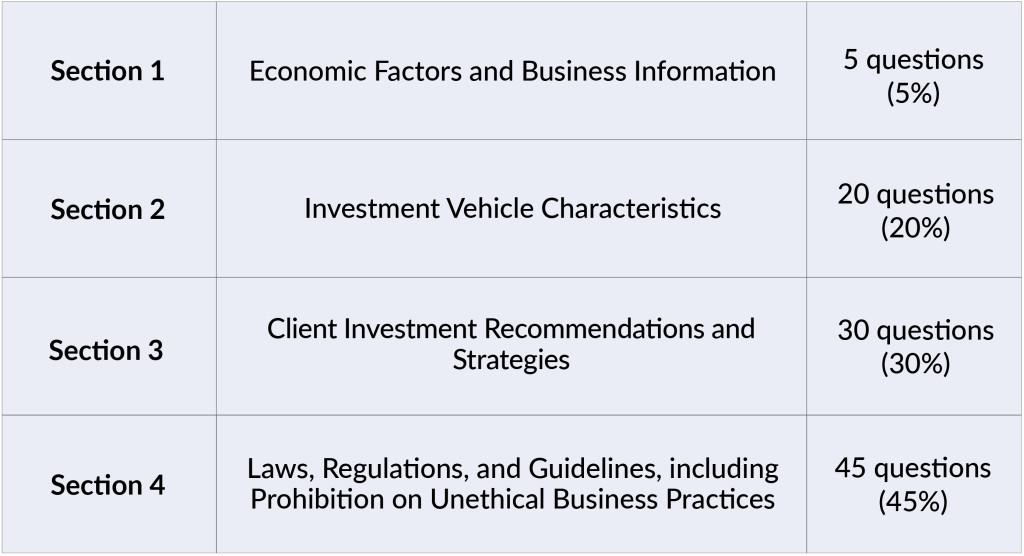What does the Series 66 exam allow me to do?
The Series 66, also known as the Uniform Combined State Law Exam, is created by the North American Securities Administrators Association (NASAA), which represents state securities regulators in the United States, Canada, and Mexico. Passing the Series 66 exam is like passing both the Series 63 (Uniform Securities Agent State Law Examination) and the Series 65 (Uniform Investment Adviser Law Examination). However, to register as an investment adviser representative with the Series 66, you must also pass the FINRA Series 7 General Securities Representative exam. In conjunction with the Series 7 license, the Series 66 license qualifies you as both an investment advisor representative and a securities agent.
As an investment adviser representative, an individual can perform the following tasks:
-
- Make recommendations and render general advice regarding securities
- Manage accounts or portfolios of clients
- Solicit, offer, or negotiate for the sale of investment advisory services
- Supervise employees who perform any of the above tasks.
Note that the Series 7 exam is a co-requisite to the Series 66, so you can take the exams in either order. However, Solomon recommends passing the Series 7 before the Series 66 since much of the information tested on the Series 7 is likely to appear on the Series 66 exam.
About the Exam
The Series 66 exam consists of 100 scored and 10 unscored multiple-choice questions covering the four sections of the NASAA Series 66 exam outline. The 10 additional unscored questions are ones that the exam committee is trying out. These are unidentified and are distributed randomly throughout the exam. The NASAA updates its exam questions regularly to reflect the most current rules and regulations.

Note: Scores are rounded down to the next lowest whole number (e.g. 72.9% would be a final score of 72% – not a passing score for the Series 66 exam).
Topics Covered on the Exam
The NASAA divides the Series 66 exam into four sections:

The Series 66 exam covers many topics including the following:
-
- Business Cycles and Economic Factors
- Fundamental Analysis
- Types of Risk
- Equity and Debt Securities
- Investment Companies
- Discounted Cash Flow
- Derivatives
- Alternatives and Insurance Products
- Clients and Client Profiles
- Capital Market Theory, Portfolio Management, and Taxation
- Taxation of Debt and Equity Securities
- Retirement Plans, ERISA, Special Accounts
- Trading and Performance Measures
- Regulations of Securities Professionals
- Regulations of Securities and Issuers
- Remedies and Administrative Provisions
- Recordkeeping Requirements
- Net Worth/Net Capital Requirements
- Business Practices for IAs and IARs
- Performance-based fees
- Wrap fees
- Custody
- Communication with Clients and Prospects
- Compensation and Client Funds
- Conflicts of Interest
Question Types on the Exam
The Series 66 exam consists of multiple-choice questions, each with four options. You will see these question structures:
Closed Stem Format:
This item type asks a question and gives four possible answers from which to choose.
Which of the following is not a current asset?
-
- Inventory
- Accounts receivable
- Cash
- Trademarks
Incomplete Sentence Format:
This kind of question has an incomplete sentence followed by four options that present possible conclusions.
Callable preferred stock is more likely to be called when:
-
- Interest rates go up.
- Interest rates go down.
- The price of the common stock rises.
- The price of the common stock falls.
“EXCEPT” Format:
This type requires you to recognize the one choice that is an exception among the four answer choices presented.
An investor calculating the investing merits of a payment or payments not yet received might potentially use all of the following except:
-
- Present value
- Net present value
- Future value
- Internal rate of return
Complex Multiple-Choice (“Roman Numeral”) Format:
For this question type, you see a question followed by two or more statements identified by Roman numerals. The four answer choices represent combinations of these statements. You must select the combination that best answers the question.
Pick two statements that best represent time-weighted and dollar-weighted returns:
-
- Conceptually, the time-weighted return is the compounded growth rate of the initial investment over a given period of time, and is calculated using the geometric mean rather than the arithmetic mean.
- Conceptually, the dollar-weighted return is the compounded growth rate of the initial investment over a given period of time and is calculated using the geometric mean rather than the arithmetic mean.
- Conceptually, a time-weighted return is the internal rate of return on an investment.
- Conceptually, a dollar-weighted return is the internal rate of return on an investment.
-
- I and III
- I and IV
- II and III
- II and IV
This format is also used in items that ask you to rank or order a set of items from highest to lowest (or vice versa), or to place a series of events in the proper sequence.
Rank the following categories of mutual funds in order of volatility, from highest to lowest.
-
- Growth and income
- Balanced
- Growth
- Equity income
-
- I, III, II, IV
- III, II, I, IV
- III, I, II, IV
- III, I, IV, II
Answers: D, B, C, B, D
For an even better idea of the possible question types you might encounter on the Series 66 exam, try Solomon Exam Prep’s free Series 66 Sample Quiz.
How to Study for the Series 66 Exam
Follow Solomon Exam Prep’s proven study system:
-
- Read and understand. Read the Solomon Study Guide, carefully. The Series 66 is a knowledge test, not an IQ test. Many students read the Study Guide two or three times before taking the exam. To increase your ability to focus while reading, or as an alternative to reading, listen to the Solomon Series 66 Audiobook, which is a word-for-word reading of the Study Guide.
- Answer practice questions in the Solomon Exam Simulator. When you’re done with a chapter in the Study Guide, take 4–6 chapter quizzes in the Solomon Series 66 Online Exam Simulator. Use these quizzes to give yourself practice and to find out what you need to study more. Make sure you read and understand the question rationales. When you’re finished reading the entire Study Guide, review your handwritten notes once more. Then, and only then, start taking full practice exams in the Exam Simulator. Aim to pass at least six full practice exams and try to get your Solomon Pass Probability™ score to at least an 80%; when you reach that point, you are probably ready to sit for the Series 66 exam.
Use these effective study strategies:
-
- Take handwritten notes. As you read the Study Guide, take handwritten notes and review your notes every day for 10 to 15 minutes. Studies show that the act of taking handwritten notes in your own words and then reviewing them strengthens learning and memory.
- Make flashcards. Making your own flashcards is another powerful and proven method to reinforce memory and strengthen learning. Solomon also offers digital flashcards for the Series 66 exam.
- Research. Research anything you do not understand. Curiosity = learning. Students who take responsibility for their own learning by researching anything they do not understand get a deeper understanding of the subject matter and are much more likely to pass.
- Become the teacher. Studies show that explaining what you are learning greatly increases your understanding of the material. Ask someone in your life to listen and ask questions. If you don’t have anyone, explain it to yourself. Studies show that helps almost as much as explaining to an actual person (see Solomon’s previous blog post to learn more about this strategy!).
Take advantage of Solomon’s supplemental tools and resources:
-
- Use all the resources. The Resources folder in your Solomon student account has helpful information, including a detailed study schedule that you can print out – or use the online study schedule and check off tasks as you complete them.
- Watch the Video Lecture. This provides a helpful review of the key concepts in each chapter after reading the Solomon Study Guide. Take notes to help yourself stay focused.
-
Good practices while studying:
- Take regular breaks. Studies show that if you are studying for an exam, taking regular walks in a park or natural setting significantly improves scores. Walks in urban areas or among people did not improve test scores.
- Get enough sleep during the period when you are studying. Sleep consolidates learning into memory, studies show. Be good to yourself while you are studying for the Series 66: exercise, eat well, and avoid activities that will hurt your ability to get a good night’s sleep.
You can pass the NASAA Series 66 Exam! It just takes focus and determination. Solomon Exam Prep is here to support you on your path to becoming a registered securities agent and investment advisor representative.
To explore all Solomon Exam Prep’s Series 66 study materials, including product samples, visit the Solomon website here.
For more helpful securities exam-related content, study tips, and industry updates, join the Solomon email list. Just click the button below:

